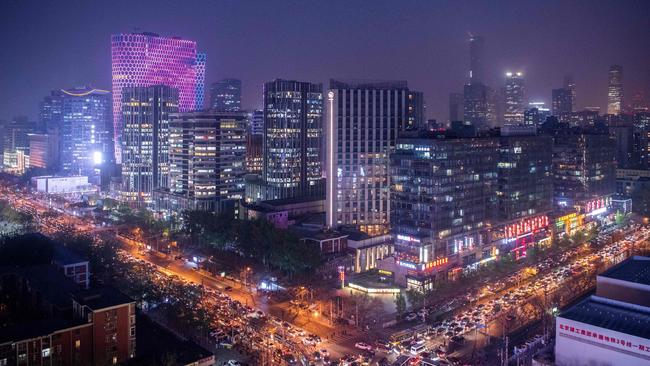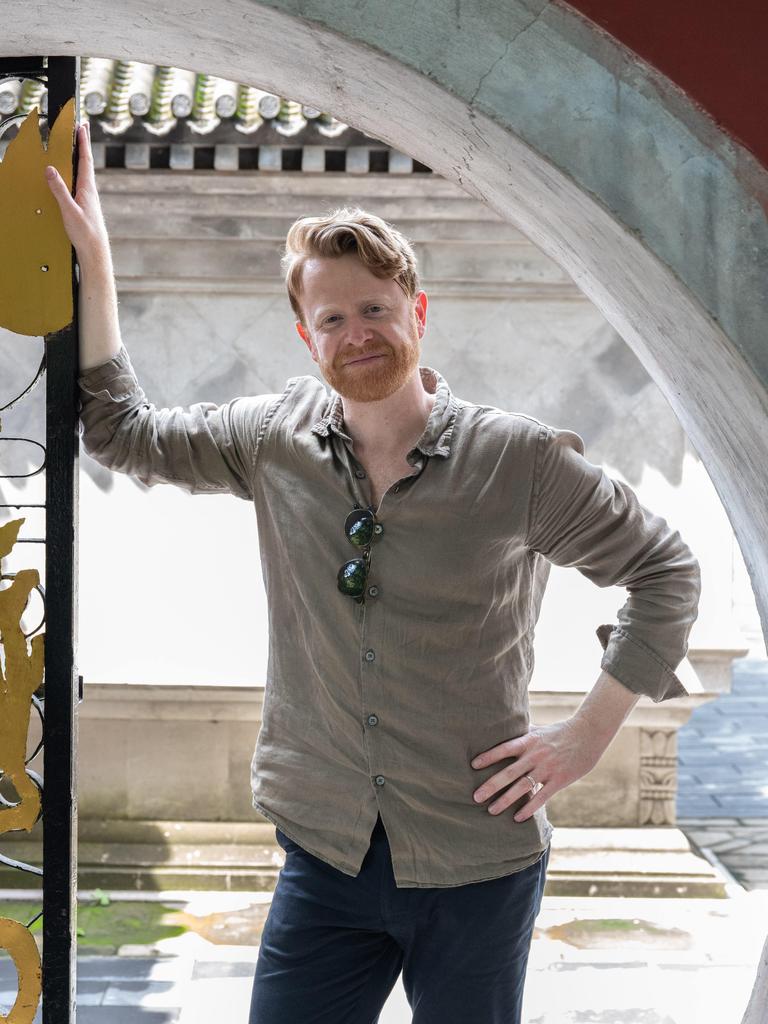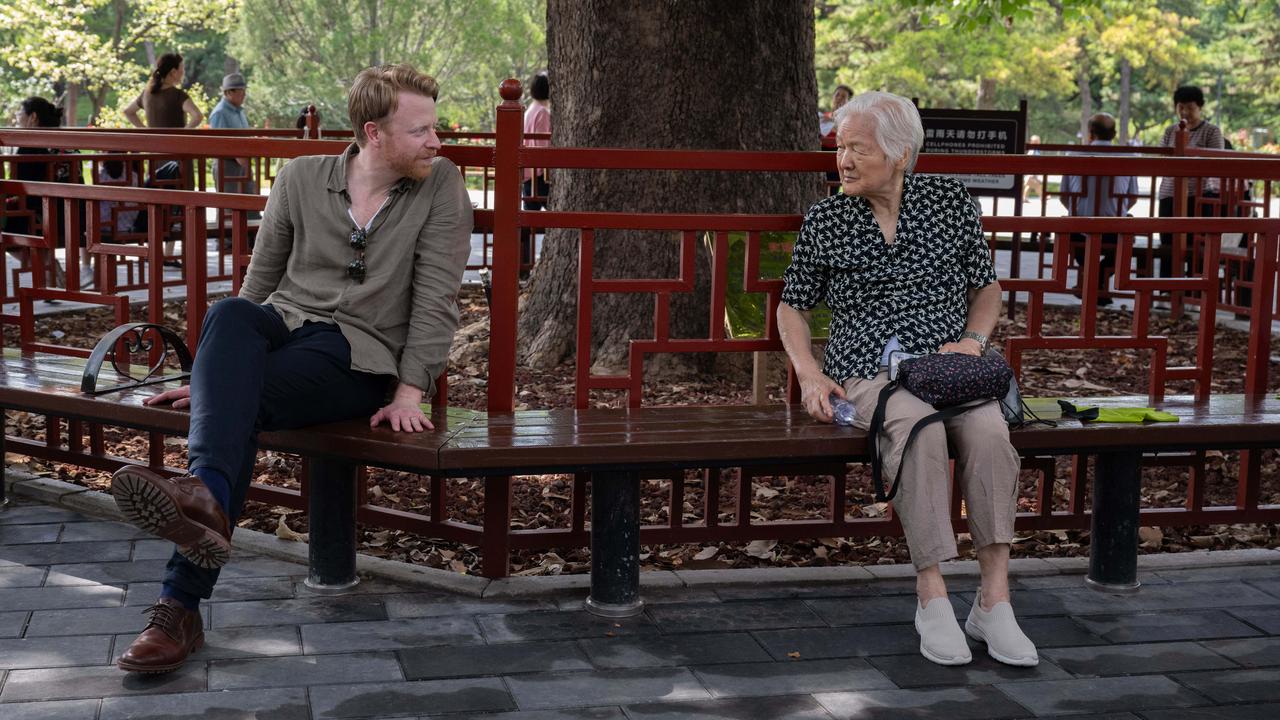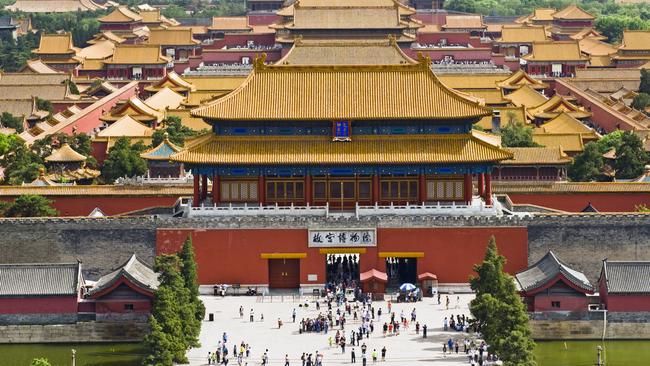After a four-year forced hiatus, The Australian is back in Beijing – and just in time to cover one of the most extraordinary stories of the 21st century.
It’s one that affects us all. Perhaps no other will have as big an impact on the health of Canberra’s Treasury over the next decade. Certainly no other causes Australian Defence planners to lose more sleep. It’s the story of what China does next.
Years of meetings over tea with Chinese diplomats preceded my return. Then in May, to my surprise, came an invitation letter from the Chinese government. After that it was off to Canberra for discussions with the Australian government.
A fortnight ago, after receiving the final necessary green light, I flew into Beijing from Taipei to become the first journalist working for Australian media to be based here since August 2020. Following the clearing of a series of further Chinese bureaucratic hurdles, this week I was issued a foreign reporter’s press card — and with that little piece of plastic, China’s almost four-year black-listing of Australian media came to an end.
For now The Australian is the only one here. My conversations with Chinese officials suggest that might change by next year, although nothing is clear.
The beginning of the return of Australian media is another manifestation of the improvement in diplomatic relations with China under the Albanese government, which continues despite a host of ongoing disagreements.
Far from everyone in Beijing is thrilled about the development.
“Some think, if there are no Australian journalists, there is no trouble,” said one person familiar with the bureaucratic struggle that has taken place within China’s sprawling bureaucracy.
It is by no means an exclusively Australian problem. The size of the English-language foreign-media presence here is a fraction of what it was when I was based in Beijing for The Australian in the first half of 2020.
There’s not a single Canadian outlet. The American headcount is about a tenth of what it was. European correspondents tell me it has also got much harder for them as Beijing’s relationship with Brussels has deteriorated.
Even in our depleted numbers, foreign journalists are not a popular species in China — no surprise considering the routine demonisation of international media by Beijing’s propaganda machine.
Sitting side by side on a bench in Beijing’s Ritan Park on another gorgeous blue-sky summer’s day I found myself talking to an 80-something-year-old lady. More than 18 months after China’s Covid walls came down, non-Chinese faces still stick out here, even in a park surrounded by foreign embassies.
The woman, a retired doctor, had asked where I was from. It prompted an excited retelling of a trip in 1984 when she had visited Sydney’s Children’s Hospital. She beamed recalling the formative experience. Soon she was asking for my WeChat details so we could stay in touch.
But then one word changed everything. I told her why I had moved to Beijing a week earlier. Her smile vanished.
“A journalist?” she asked incredulously. She repeated the strange, sinister word, looking nervous. “You got a visa?”

Beijing by night.
A confidence problem
The Chinese government is fond of saying “seeing is believing” and I agree.
In my first fortnight back in Beijing, it’s clear there is nothing at all fake about the troubles hitting the Chinese economy.
Headspinningly, all this is taking place as China’s economy continues to grow at about 5 per cent a year, according to institutions as credible as the Washington-headquartered IMF. That’s snail-paced compared with the boom years, but it is a level almost any other major economy would envy.
More than 70 per cent of Chinese investment is in domestic real estate, an industry that remains in a dire state. That’s had a devastating impact on people’s sense of wealth.
Real estate agents speak candidly about how grim things are. “People are still testing if it will fall lower,” said one, glumly.
In the part of Beijing where I live, prices are down about 20 per cent from their 2022 peaks, which is far from catastrophic, considering decades of growth. But on the outskirts of the city, some have fallen by more than half their peak value. In many places outside China’s capital, things are much worse – with abandoned buildings dotting the outskirts of most cities.
“What will happen to them?” said one person just back from a trip to Inner Mongolia, in China’s north, and still reeling at the numbers of empty and unfinished buildings he had seen.
Even if their wages have increased, many feel poorer because their real estate investments have fallen so much. The stock market is similarly dismal. That’s slashed consumer spending.
As Australia continues to fight inflation, over in China deflation has taken hold. Across the economy, prices are falling. Beijing’s restaurants are amazingly cheap – great news for diners but tough for the industry, one of the country’s biggest employers.

In my first fortnight back in Beijing, it’s clear that there is nothing at all fake about the troubles hitting the Chinese economy.
- Will Glasgow
Even dentists here say they are in a “price war” to attract customers, many of whom have decided that work on their teeth is a luxury they can’t afford with so much uncertainty about the future.
The government now speaks with notable candour about the problem. “The so-called ‘crisis’ is about confidence,” one official told The Weekend Australian. “The problem is: how to build confidence?”
Australia has an enormous stake in China’s success in answering that question. None of this is to be alarmist. As Chinese officials point out, not-so-distant history shows the country has gone through much tougher periods. Reforms in the 1990s put tens of millions of people out of work almost overnight – and that was when the country was far poorer than today.
Most people in China in 2024 are leading lives of unimaginable material prosperity compared to most Chinese back then.
Being in Beijing is a useful reminder that, for all the economic trouble, there remains a huge amount of money among the country’s wealthy urban elite. While dentists are struggling, gourmet pet-food shops are booming. There are still many seriously cashed-up Chinese consumers parading through Beijing’s ritzy Sanlitun shopping playground Taikoo Li.

The roads are jammed with new-model electric vehicles, more and more of them Chinese brands that hardly existed four years ago. They are going global too. Last year, China overtook Japan as the world’s biggest car exporter. Sales to Australia are soaring, although in another paradox most of China’s carmakers are losing money even as their output grows.
The domestic car market is beyond saturated with new models. This week, the Chinese car dealer association released a report that showed more than half of its members operated at a loss in the first six months of this year. Dealer satisfaction is the lowest in a decade.
‘Collapsists’ beware
For all the dire headlines, the IMF forecasts that China – even with all its property, dental and car-dealer woes – is on track to grow by just over 5 per cent this year.
It grew at a similar rate in 2023 when Australia set a new export record to China — more than $200bn worth, way beyond the levels recorded in the breakneck growth era. That 5 per cent level saw China contribute about one-third of world growth last year.
In another head-spinning statistic, China’s economy has grown by 20 per cent in the four years I have been away, according to the IMF’s purchasing power parity measurements.
For all the drama of the US-China trade war, the Covid pandemic and an increasingly brittle international trading environment, China’s economy is 50 per cent larger than it was in 2016.
Even with China’s slowing growth rate, the IMF projects its economy will be almost another 20 per cent larger in five years.
The moderation of China’s economic growth was to be expected, says Shiro Armstrong, director of the ANU’s East Asian Bureau of Economic Research. It is a textbook phenomenon as economies become richer and ascend the development curve.
That’s not to dismiss the real policy dilemmas facing Beijing.
“There are big challenges to sustaining growth and development but the collapsists – those who for decades have been claiming the Chinese economy is on the brink of collapse – are likely to continue to be wrong even if the headwinds pick up,” Dr Armstrong says.
A lot of the growth over the past four years has come from public spending. Since I left in June 2020, Beijing has a new sports stadium, at least another three giant museums (including a whopper to celebrate the Communist Party), a new convention centre, dozens of new metro stops, a new 75,000sqm library and too many other smaller projects to list.
There were also the innumerable Covid quarantine centres built across the country, which even if they were never used added to China’s GDP.
Huge government-backed projects continue across the country. At a low-key meeting earlier this week, Premier Li Qiang approved the construction of another 11 nuclear power reactors to be spread across five nuclear power stations.
They will be built by state-owned power companies. The estimated construction cost is 200 billion yuan ($42bn). And as with all construction projects across China, they will likely be full of Australian iron ore.
‘You’ll find challenges’
Four years is a fair chunk of China’s modern history. Apparently it’s enough time to drastically improve the quality of Beijing’s air.
That’s been a welcome surprise. Every day for the fortnight I’ve been here has scored a good reading on my air-quality app. On many days, it’s nearly at Sydney or Taipei levels. Not once have I had to think about strapping on a horrid pollution face mask to go for a jog as I used to routinely.
Summer rain showers have helped, but reliable firms that track international air quality show the change is real. In Beijing, at least, “airpocalypse” – when the city’s deadly air was the most polluted in the world – is a bad memory. That said, my apartment has an air purifier, which I will no doubt be very grateful for when the skies next get ugly.
Beijing’s rivers are cleaner too. The Liangma River, essentially a soggy garbage dump back in 2020, has been transformed. People paddle board and swim in it – a disgusting thought four years ago.
Now people increasingly eat and drink at picturesque outdoor restaurants and bars along the river, an awful experience in the city’s smoggy recent past. On a summer’s night, it looks delightful.
Those environmental improvements have been led from the top and have occurred with what Beijing likes to call “China speed”. I have heard even trenchant political critics admit that, on the environment, President Xi Jinping has an impressive legacy.
Beijing’s coffee scene has improved. The barista at a great new spot in my neighbourhood could easily fit into a Melbourne cafe, if not for her habit of practising her calligraphy in between new customers arriving. Of course, alfresco dining in a rich part of Beijing or spending $7 for a coffee is a long way from the lives of most of China’s 1.4 billion people.

The Forbidden City from the air.
In one of my arrival interviews with part of China’s sprawling security state, I asked the young officer if he had been to Australia. “I don’t even have a passport!” he answered, laughing at the idea.
His older comrade said the same, although both said perhaps when they retired they would, if they could afford it. One had heard that “Australia has a big rock”, which he was curious to see.
No journalist should move to China if they want an easy life. Multiple Chinese officials have been frank about what I will experience as I travel around the country over the coming months. “If you are a journalist, the police will be nervous. You will find challenges,” one explained matter of factly.
The internet is even worse than four years ago. China’s infamous Great Firewall is harder to scale – and it was already a headache-inducing ordeal in 2020. Upgrades to China’s internet barricades used to be annual. Now they take place at least monthly.
Express VPN, the most popular service to get onto the ex-China internet only four years ago, doesn’t work at all. “It got too popular,” a person familiar with China’s internet restrictions explained to me.
For all the reporting obstacles and the well-known security concerns, there was no way The Australian could turn down the opportunity to be based in Beijing again. This is just too important a story to report remotely. That’s why there are still dozens of journalists in cities around the region – from Taipei to Tokyo, Seoul to Singapore – trying to get visas that will allow them to report in China.
So here I am now for, I hope, a bit longer than the six months of my first posting to Beijing. Although with China, you never quite know what will happen next.


More Coverage
Will Glasgow is The Australian’s North Asia Correspondent, now based in Beijing. He has lived and reported from Beijing and Taipei since 2020. He is winner of the Keith McDonald Award for Business Journalist of the Year and previously worked at The Australian Financial Review.
Add your comment to this story
To join the conversation, please log in. Don't have an account? Register
Join the conversation, you are commenting as Logout